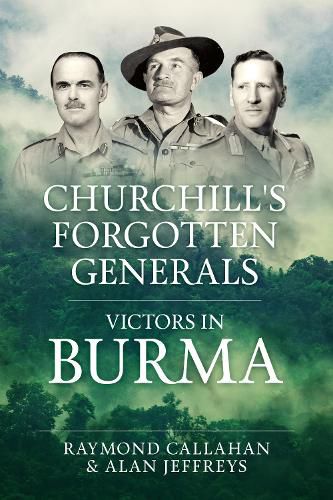Readings Newsletter
Become a Readings Member to make your shopping experience even easier.
Sign in or sign up for free!
You’re not far away from qualifying for FREE standard shipping within Australia
You’ve qualified for FREE standard shipping within Australia
The cart is loading…






Generals Auchinleck, Slim and Savory and their role in the campaigns in Northeast India and Burma (Myanmar) have been largely forgotten in the historiography of the Second World War. Prime Minister Winston Churchill sacked General Claude Auchinleck as Commander-in-Chief (C-in-C) in the Mediterranean and Middle East theatre after the First Battle of Alamein. However, Auchinleck became C-in-C India for the remainder of the Second World War. In this role, he was essential in making sure the Indian Army was geared towards jungle warfare, but also improved the lot of both Indian officers and men not least by improving pay and conditions. General William Slim is perhaps better known as the successful commander of the 14th Army who also wrote one of the best books on the war: Defeat into Victory, an apt description of the campaign in Burma. He was a popular commander and referred to as General 'Bill' Slim by the British and Indian soldiers who served under him. Auchinleck and Slim both became Field Marshals after the war. Major General Reginald Savory played an essential role as the Director of Infantry from 1943 until the end of the war. He made sure that all infantry battalions and training establishments across India were trained for jungle warfare. His was a forgotten role that until now has not been documented. He retired as a Lieutenant General having been Adjutant General until the Independence of India and Pakistan in 1947. The appointments of Auchinleck, Slim and Savory in 1943 were an important factor in the eventual defeat of the Imperial Japanese Army in Burma. It helped that the key figures in Indian military affairs were, for the first time in the war, all drawn from the Indian Army and thus understood the traditions and ways of the Indian Army. AUTHORS: Professor Raymond Callahan's interest in the Indian Army of the British Raj was kindled by reading John Masters' Bugles and a Tiger as a teenager. Since taking his PhD at Harvard he has written five books and numerous articles on the subject, including with Daniel Marston, The Burma Campaign and the Transformation of the British Indian Army (2021) which won the Templer Medal Prize. He is Professor Emeritus of History at the University of Delaware, a Fellow of the Royal Historical Society and a series editor of Helion's 'War and Military Culture in South Asia'. Alan Jeffreys is a curator at the Imperial War Museum and is an expert on tactics and training for jungle warfare and the British Army in the Far East during World War II. 30-40 b/w photos
$9.00 standard shipping within Australia
FREE standard shipping within Australia for orders over $100.00
Express & International shipping calculated at checkout
Generals Auchinleck, Slim and Savory and their role in the campaigns in Northeast India and Burma (Myanmar) have been largely forgotten in the historiography of the Second World War. Prime Minister Winston Churchill sacked General Claude Auchinleck as Commander-in-Chief (C-in-C) in the Mediterranean and Middle East theatre after the First Battle of Alamein. However, Auchinleck became C-in-C India for the remainder of the Second World War. In this role, he was essential in making sure the Indian Army was geared towards jungle warfare, but also improved the lot of both Indian officers and men not least by improving pay and conditions. General William Slim is perhaps better known as the successful commander of the 14th Army who also wrote one of the best books on the war: Defeat into Victory, an apt description of the campaign in Burma. He was a popular commander and referred to as General 'Bill' Slim by the British and Indian soldiers who served under him. Auchinleck and Slim both became Field Marshals after the war. Major General Reginald Savory played an essential role as the Director of Infantry from 1943 until the end of the war. He made sure that all infantry battalions and training establishments across India were trained for jungle warfare. His was a forgotten role that until now has not been documented. He retired as a Lieutenant General having been Adjutant General until the Independence of India and Pakistan in 1947. The appointments of Auchinleck, Slim and Savory in 1943 were an important factor in the eventual defeat of the Imperial Japanese Army in Burma. It helped that the key figures in Indian military affairs were, for the first time in the war, all drawn from the Indian Army and thus understood the traditions and ways of the Indian Army. AUTHORS: Professor Raymond Callahan's interest in the Indian Army of the British Raj was kindled by reading John Masters' Bugles and a Tiger as a teenager. Since taking his PhD at Harvard he has written five books and numerous articles on the subject, including with Daniel Marston, The Burma Campaign and the Transformation of the British Indian Army (2021) which won the Templer Medal Prize. He is Professor Emeritus of History at the University of Delaware, a Fellow of the Royal Historical Society and a series editor of Helion's 'War and Military Culture in South Asia'. Alan Jeffreys is a curator at the Imperial War Museum and is an expert on tactics and training for jungle warfare and the British Army in the Far East during World War II. 30-40 b/w photos